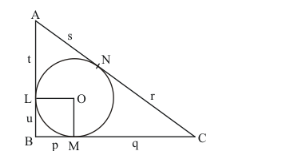ABC is a right angled triangle, right angled at B such that BC = 6 cm and AB = 8 cm. A circle with centre O is inscribed in Δ ABC. The radius of the circle is
(a) 1 cm
(b) 2 cm
(c) 3 cm
(d) 4 cm
Let us first put the given data in the form of a diagram.

Let us first find out AC using Pythagoras theorem.
$A C^{2}=A B^{2}+B C^{2}$
$A C^{2}=8^{2}+6^{2}$
$A C^{2}=64+36$
$A C^{2}=100$
$A C=10$
Also, we know that tangents drawn from an external point will be equal in length. Therefore we have the following,
BL = BM …… (1)
CM = CN …… (2)
AL = AN …… (3)
We have found that,
AC = 10
That is,
AN + NC = 10
But from (2) and (3), we can say
AL + MC = 10 …… (4)
It is given that,
AB = 8
BC = 6
Therefore,
AB + BC =14
Looking at the figure, we can rewrite this as,
AL + LB + BM + MC = 14
(AL + MC) + (BM + BL) = 14
Using (1) and (3) we can write the above equation as,
10 + 2BL = 14
BL = 2Consider the quadrilateral, BLOM, we have,
BL = BM (From (1))
OL = OM(Radii of the same circle)
$\angle L B M=90^{\circ}$ (Given data)
$\angle B L O=90^{\circ}$ (Radii is always perpendicular to the tangent at the point of contact)
$\angle B M O=90^{\circ}$ (Radii is always perpendicular to the tangent at the point of contact)
Since the sum of all angles of a quadrilateral will be equal to ![]() , we have,
, we have,
$\angle L B M+\angle L O M+\angle B L O+\angle B M O=360^{\circ}$
$90^{\circ}+90^{\circ}+90^{\circ}+\angle L O M=360^{\circ}$
$\angle L O M=90^{\prime}$
Since all the angles of the quadrilateral are equal to ![]() and since adjacent sides are equal, the quadrilateral BLOM is a square. We know that all the sides of a square are of equal length.
and since adjacent sides are equal, the quadrilateral BLOM is a square. We know that all the sides of a square are of equal length.
We have found BL = 2
Therefore,
OM = 2
OM is nothing but the radius of the circle.
Therefore, radius of the circle is 2 cm.
Hence the correct answer to the question is option (b).
